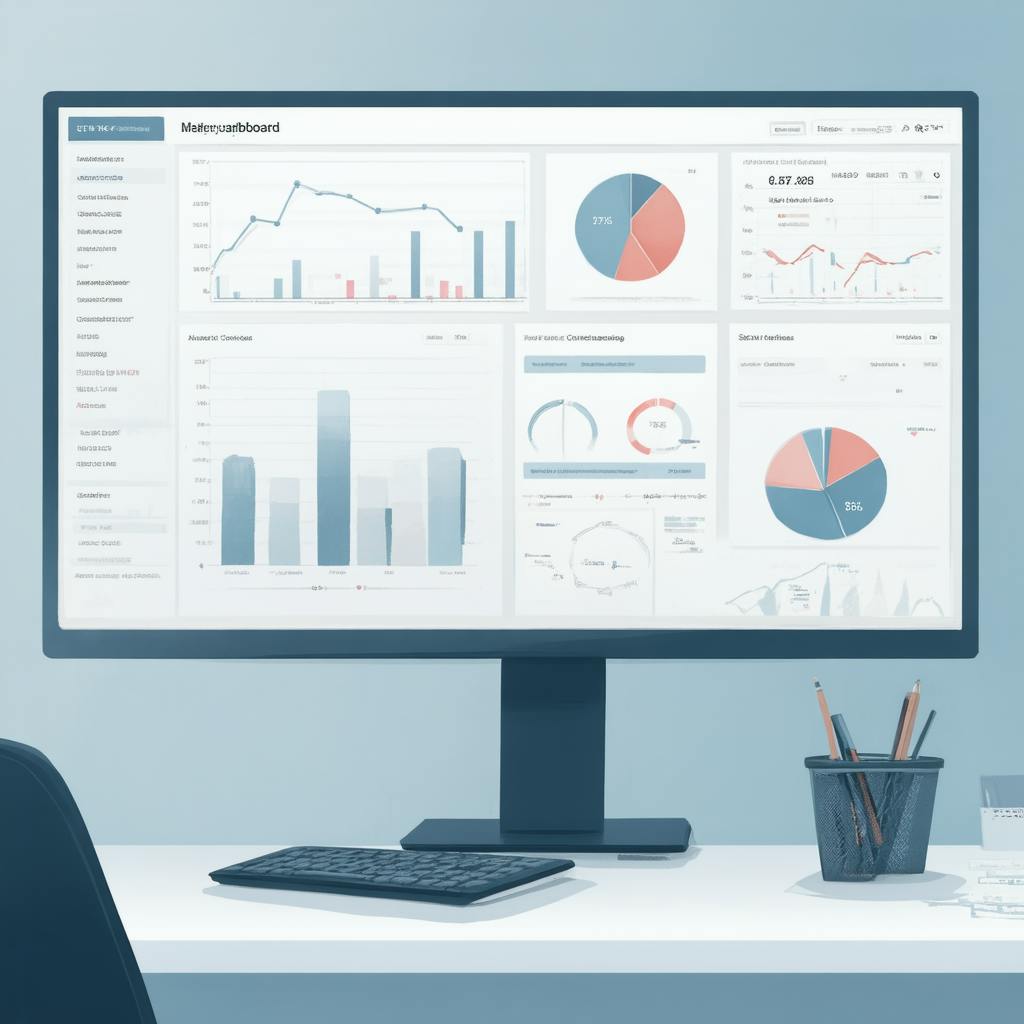In the evolving landscape of business-to-business marketing, understanding and effectively utilizing the right metrics can be the differentiator between success and stagnation. B2B marketing metrics that matter are indispensable tools for tracking success in B2B marketing and driving growth. These important B2B marketing KPIs serve as the bedrock of informed decision-making, enabling businesses to refine strategies, optimize campaigns, and ultimately accelerate growth.
Let's delve into these critical B2B marketing performance metrics to equip you with the knowledge to achieve your business objectives with pinpoint precision.
Understanding B2B Marketing Metrics
Clear Metrics
The importance of clarity in B2B marketing cannot be overstated. Clear understanding of metrics is foundational to crafting effective marketing strategies. Consider these key performance indicators:
- Lead Conversion Rate: This metric tracks the percentage of leads that successfully convert into customers, providing insight into the effectiveness of your sales funnel and marketing efforts. It's a vital indicator of success and helps identify areas in need of optimization.
- Customer Acquisition Cost (CAC): Determining how much your company spends on acquiring a new customer is crucial. Keeping CAC in check ensures sustainable growth and helps in refining budget allocations.
- Customer Lifetime Value (CLV): This metric helps assess the net profit attributed to the entire future relationship with a customer. It encourages marketers to focus on long-term value rather than short-term gains, fostering customer loyalty and repeat business.
Concise Metrics
Incorporating concise metrics allows for quick assessment and rapid decision-making:
- Return on Marketing Investment (ROMI): This snap metric calculates revenue growth compared to marketing investment, offering a quick gauge of marketing effectiveness and efficiency.
- Website Traffic Sources: Knowing where your traffic originates—whether organic, paid, referral, or social—can inform strategic adjustments and reveal which channels are driving the most engagement.
- Email Marketing Performance: Metrics such as open rates, click-through rates (CTR), and response rates help optimize email campaigns to engage potential leads more effectively.

AI made with Dean Jones
Compelling Metrics
These metrics create compelling narratives that resonate with stakeholders and drive engagement:
- Engagement Rate: This metric measures how users interact with your content across various platforms. High engagement often translates to brand loyalty and increased influence in your industry.
- Social Media Reach and Influence: While B2B organizations might prioritize other channels, social media still plays a significant role in building brand awareness and credibility. Tracking your influence and reach on these platforms is critical.
- Net Promoter Score (NPS): A compelling indicator of customer satisfaction and loyalty, NPS provides actionable insights into the customer experience and the likelihood of referrals.
Credible Metrics
Credible metrics enhance trust and reinforce strategy validation:
- Pipeline Growth Rate: A reliable measure of how quickly you are acquiring new leads and opportunities, this metric is crucial for planning and forecasting business growth.
- Sales Cycle Length: The duration from lead acquisition to conversion can offer insights into the efficiency of your sales process, helping to streamline operations and enhance productivity.
- Churn Rate: Tracking customer retention versus the rate of churn aids in identifying retention issues and potential for improvement in customer service or product offerings.
B2B Marketing Metrics That Matter: An FAQ Guide
In the dynamic landscape of B2B marketing, understanding and leveraging key metrics is crucial for strategizing and optimizing business efforts. This FAQ article delves into the essential B2B marketing metrics, explaining their importance, how they can refine your business strategies, and the best tools to track them effectively.
What are the key metrics to track in B2B marketing?
When it comes to B2B marketing, several metrics can provide valuable insights into the effectiveness of your campaigns. Here are the key metrics to focus on:
Lead Generation Metrics
- Lead Volume: The total number of leads generated over a specific period.
- Lead Quality: The conversion potential of generated leads based on predefined criteria.
Engagement Metrics
- Website Traffic: The number of visitors to your site and their behavior.
- Content Engagement: Metrics such as average time on page, bounce rate, and content shares.
Conversion Metrics
- Conversion Rate: The percentage of leads that result in meaningful actions, like downloads or contact requests.
- Sales-Qualified Leads (SQLs): Leads that are ready to move into the sales process.
Revenue Metrics
- Customer Acquisition Cost (CAC): The total cost to acquire a new customer.
- Customer Lifetime Value (CLV or LTV): The projected revenue a business will earn from a customer throughout the relationship.
Retention Metrics
- Churn Rate: The percentage of customers who stop doing business with you.
- Renewal Rate: The percentage of customers who renew their contracts or subscriptions.
Why are these B2B marketing metrics considered important?
These metrics are vital because they provide a comprehensive view of your marketing performance:
- Lead Generation Metrics: Help assess how well your campaigns attract potential customers and identify areas for improvement in targeting and outreach strategies.
- Engagement Metrics: Provide insights into how potential leads interact with your digital assets, allowing you to optimize content and improve the user experience.
- Conversion Metrics: Offer a direct link between marketing activities and their effectiveness in driving sales, helping allocate resources more efficiently.
- Revenue Metrics: Essential for understanding the financial efficiency of your marketing efforts and guiding pricing and budgeting decisions.
- Retention Metrics: Highlight the health of customer relationships and inform strategies to improve customer satisfaction and loyalty.

AI made with Dean Jones
How can B2B marketing metrics help improve my business strategy?
B2B marketing metrics can significantly enhance business strategy in several ways:
- Informed Decision-Making: Provides data-driven insights that allow for strategic decisions on budget allocation, campaign focus, and resource management.
- Optimization of Marketing Campaigns: Helps identify which tactics drive results and which do not, enabling marketers to refine and optimize their marketing efforts for higher ROI.
- Enhanced Customer Understanding: By analyzing engagement and conversion metrics, businesses can gain deeper insights into customer needs and preferences, leading to more personalized and effective marketing.
- Strategic Growth Planning: Revenue and retention metrics provide the necessary information to forecast future growth, set realistic goals, and plan for scaling operations.
What are the best tools to track B2B marketing metrics that matter?
Several tools are designed to help you track and analyze B2B marketing metrics effectively:
- Google Analytics: A powerful tool for tracking website traffic and engagement metrics, offering detailed reports on visitor behavior.
- CRM Software (e.g., Salesforce, HubSpot): Helps track lead quality, conversion rates, and provides a centralized location for customer data.
- Marketing Automation Platforms (e.g., Marketo, Pardot): Offer features for managing lead generation, nurturing, and tracking engagement across multiple channels.
- BI Tools (e.g., Tableau, Power BI): These tools allow for sophisticated data analysis and visualization, making it easier to interpret complex data sets.
- SEO Tools (e.g., SEMrush, Ahrefs): Useful for tracking website performance and visibility metrics, helping to optimize content for search engines.
By leveraging these tools, B2B marketers can gain a comprehensive view of their campaigns, making it possible to extract actionable insights and drive sustained business growth.
Conclusion
In synthesizing the essential B2B marketing metrics that matter, the journey towards understanding and acting on these indicators becomes clear. From lead conversion rates and customer acquisition costs to engagement rates and social media influence, each KPI provides valuable insights that, when aggregated, paint a comprehensive picture of your marketing effectiveness. Leveraging these business-to-business marketing metrics effectively ensures sustainable growth, strengthens stakeholder confidence, and rigorously tracks success in B2B marketing.
Remember, while metrics provide the guidance needed to unlock potential and track performance, it is the strategic implementation of insights gained from these metrics that truly drives B2B growth through marketing metrics. Keep these metrics top-of-mind as you craft strategies poised for success.

